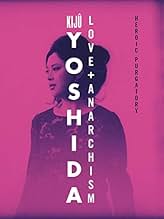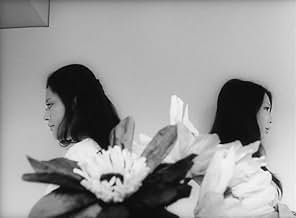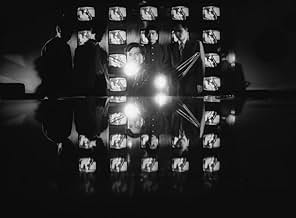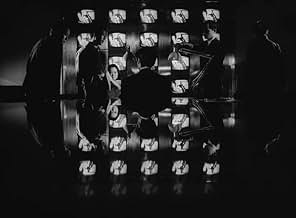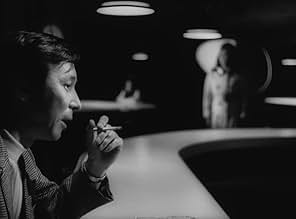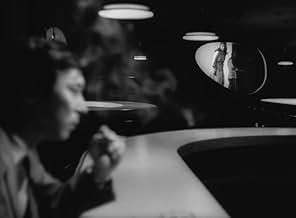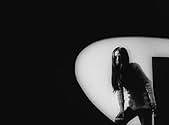Füge eine Handlung in deiner Sprache hinzuAn engineer's wife returns home with a lost teenager. A man posing as her dad tries to get her back, causing the engineer to recall his youth as a revolutionary, obscured by dreamlike disrup... Alles lesenAn engineer's wife returns home with a lost teenager. A man posing as her dad tries to get her back, causing the engineer to recall his youth as a revolutionary, obscured by dreamlike disruptions of time and space, fantasy and reality.An engineer's wife returns home with a lost teenager. A man posing as her dad tries to get her back, causing the engineer to recall his youth as a revolutionary, obscured by dreamlike disruptions of time and space, fantasy and reality.
Empfohlene Bewertungen
From the very first frame, you know you are in for something different. The first thing that strikes you is the composition of the visuals. Each frame is an avant-garde work of art. If you turned off the sound and simply watched the visuals it would be worth the time.
The plot is complex and enigmatic. Intentionally ambiguous, it deals with love, truth, reality and the validity of political action. Although it is enigmatic, it is not boring. Instead it stimulates thought on these subject. The ambiguity of the plot means that there are no easy answers and viewers must make up their own minds on these weighty subjects. It also means that the film can be viewed several times.
This is an "art film". The director was a major figure in the Japanese new wave that started in the 60's and watching this film one is reminded of Alain Resnais, although this is not a copy of his style. The film is part of a trilogy of "sex and politics" films (Eros plus massacre; Heroic Purgatory ; Coup D'Etat).
You will not like this if you are looking for an entertaining film, or a film with action, sex, comedy, great one liners and all those other things that can make a film entertaining. There is nothing wrong with such films but this one one of them. It is a film that will make you think.
Finding a good copy of this or any of this director's other films can be difficult. This particular film can be found if you search the internet but it is usually found with very poor and incomprehensible subtitles. Recently someone has made a new subtitle translation but it is very hard to find. I wouldn't recommend the film without this new translation unless you are a Japanese speaker. Subtitles that begin "This morning I lift the floor There are 3 worms" should be avoided. Those that begin "This morning, there were three cockroaches," are good. But on the other hand just watching the visuals can be worth it.
The plot is complex and enigmatic. Intentionally ambiguous, it deals with love, truth, reality and the validity of political action. Although it is enigmatic, it is not boring. Instead it stimulates thought on these subject. The ambiguity of the plot means that there are no easy answers and viewers must make up their own minds on these weighty subjects. It also means that the film can be viewed several times.
This is an "art film". The director was a major figure in the Japanese new wave that started in the 60's and watching this film one is reminded of Alain Resnais, although this is not a copy of his style. The film is part of a trilogy of "sex and politics" films (Eros plus massacre; Heroic Purgatory ; Coup D'Etat).
You will not like this if you are looking for an entertaining film, or a film with action, sex, comedy, great one liners and all those other things that can make a film entertaining. There is nothing wrong with such films but this one one of them. It is a film that will make you think.
Finding a good copy of this or any of this director's other films can be difficult. This particular film can be found if you search the internet but it is usually found with very poor and incomprehensible subtitles. Recently someone has made a new subtitle translation but it is very hard to find. I wouldn't recommend the film without this new translation unless you are a Japanese speaker. Subtitles that begin "This morning I lift the floor There are 3 worms" should be avoided. Those that begin "This morning, there were three cockroaches," are good. But on the other hand just watching the visuals can be worth it.
'Heroic Purgatory' has suffered most of from the obscurity into which Yoshida's trilogy of radicalism has been cast. At least an hour shorter than its predecessor, 'Eros Plus Massacre', it takes that film's tendency to narrative compression and ellipses to an extreme, and a first viewing may render elements virtually incomprehensible, as Yoshida's characteristically bleached-out, askew framing renders public, exterior space a bleached-out, ghostly horizon, glimpsed in the distance as if in perpetual mist or blinding sunlight, and domestic, and interior space an endless series of corridors or bedrooms, of secret spaces, in which characters endlessly circle the space and each other.
The film opens as Nanako (Mariko Okada) witnesses what appears to be the attempted suicide of a young woman, Ayu (Kazumi Tsutsui), who then follows her to the apartment she shares with her husband, engineer Rikiya (Kaizo Kamoda), the three becoming a kind of strange family unit of 'adopted' children, absent parents and power triangulations. (It's never made clear in Ayu in fact exists or is a kind of mutual projection of the childless couple). Ayu, who, at least initially, speaks only rarely, claims to be 'lost' and disowns the 'father' who comes to the couple's flat to claim her, and who may or may not be either a police spy, a member of the revolutionary cell in which Rikiya was formerly involved, or a genuine father who has lost both his wife and daughter. As the film unfolds, Rikiya recalls his past within that cell during the signing of the 1952 San Francisco treaty--a de facto ceding of colonial power to the occupying American forces, beyond the period of ostensible occupation--as a planned attempt to either kidnap or assassinate an ambassador collapses due to the possible intervention of a spy within the group. This moment is played out again and again, shifting in time and location from 1952 to 1960 (the signing of another treaty of compromise), 1970 (when the film was made) and 1980, ten years in the future: actors play multiple roles, as the original members of the 1952 cell appear to take up roles in 'official society' and their successors among the new waves of radical movements turn against them.
'Eros' memorably presented three alternate versions of the attempted murder that forms the film's climax. Here, virtually every incident appears to be replayed in numerous ways: most notably, the act of potential betrayal and the subsequent trial and possible execution of the supposed 'spy'. A puzzle film like 'Out 1' or 'Inland Empire', 'Heroic Purgatory' is nonetheless more a political than a philosophical reflection. The film ends at the train station at which much of the action has taken place, as Nanako and her 'daughter' board an empty train, only to exit once more and walk back along the platform in front of a sign which reads 'dead end'. They exchange brief dialogue. 'It's over. Nothing left'. 'There's still things to do.' 'Depart to a distant place?' 'I will get rid of what I thought my God was'. As the two women walk towards the camera (back to the city, back to society), the camera focuses on the 'Dead End' sign, previously only a blurred smudge of white in the background, before blurring it out once more. It's a perfect in-joke: the traditional signing off of a film, the boundary re-established between life and cinema, the mechanism of narrative closure that rounds off in a neat summary, with the English language signage reflecting the enforced dominance of American culture and its representational strategies. The Dead End would also seem to refer to the attempt to change society through underground political action, in which, for Yoshida, the same mistakes repeat: the hierarchy, repetition of trauma and, in particular, the patriarchal violence and sadism--which at once condemns sexuality as counter-revolutionary distraction and sublimate it into gendered cruelty. The inability to break a cycle of various kinds of repetition, even in the most radical, vanguard, progressive or advanced of movements--whether official technocracies or revolutionary organisations--is the film's purgatorial territory. It's perfectly possible to view the as presenting a jaded perspective of liberal cynicism. Yet such a view more easily, more comfortably, more cynically fits into narratives of power, defeat and resistance than the film itself offers. Struggles for power may repeat themselves, first as tragedy, then as farce: yet this also means that resistance never ends. Viewed half a century on, Yoshida's projections of the present into both past and future suggest that, for all the moments of suppression, the revolution will continue to be fought.
The film opens as Nanako (Mariko Okada) witnesses what appears to be the attempted suicide of a young woman, Ayu (Kazumi Tsutsui), who then follows her to the apartment she shares with her husband, engineer Rikiya (Kaizo Kamoda), the three becoming a kind of strange family unit of 'adopted' children, absent parents and power triangulations. (It's never made clear in Ayu in fact exists or is a kind of mutual projection of the childless couple). Ayu, who, at least initially, speaks only rarely, claims to be 'lost' and disowns the 'father' who comes to the couple's flat to claim her, and who may or may not be either a police spy, a member of the revolutionary cell in which Rikiya was formerly involved, or a genuine father who has lost both his wife and daughter. As the film unfolds, Rikiya recalls his past within that cell during the signing of the 1952 San Francisco treaty--a de facto ceding of colonial power to the occupying American forces, beyond the period of ostensible occupation--as a planned attempt to either kidnap or assassinate an ambassador collapses due to the possible intervention of a spy within the group. This moment is played out again and again, shifting in time and location from 1952 to 1960 (the signing of another treaty of compromise), 1970 (when the film was made) and 1980, ten years in the future: actors play multiple roles, as the original members of the 1952 cell appear to take up roles in 'official society' and their successors among the new waves of radical movements turn against them.
'Eros' memorably presented three alternate versions of the attempted murder that forms the film's climax. Here, virtually every incident appears to be replayed in numerous ways: most notably, the act of potential betrayal and the subsequent trial and possible execution of the supposed 'spy'. A puzzle film like 'Out 1' or 'Inland Empire', 'Heroic Purgatory' is nonetheless more a political than a philosophical reflection. The film ends at the train station at which much of the action has taken place, as Nanako and her 'daughter' board an empty train, only to exit once more and walk back along the platform in front of a sign which reads 'dead end'. They exchange brief dialogue. 'It's over. Nothing left'. 'There's still things to do.' 'Depart to a distant place?' 'I will get rid of what I thought my God was'. As the two women walk towards the camera (back to the city, back to society), the camera focuses on the 'Dead End' sign, previously only a blurred smudge of white in the background, before blurring it out once more. It's a perfect in-joke: the traditional signing off of a film, the boundary re-established between life and cinema, the mechanism of narrative closure that rounds off in a neat summary, with the English language signage reflecting the enforced dominance of American culture and its representational strategies. The Dead End would also seem to refer to the attempt to change society through underground political action, in which, for Yoshida, the same mistakes repeat: the hierarchy, repetition of trauma and, in particular, the patriarchal violence and sadism--which at once condemns sexuality as counter-revolutionary distraction and sublimate it into gendered cruelty. The inability to break a cycle of various kinds of repetition, even in the most radical, vanguard, progressive or advanced of movements--whether official technocracies or revolutionary organisations--is the film's purgatorial territory. It's perfectly possible to view the as presenting a jaded perspective of liberal cynicism. Yet such a view more easily, more comfortably, more cynically fits into narratives of power, defeat and resistance than the film itself offers. Struggles for power may repeat themselves, first as tragedy, then as farce: yet this also means that resistance never ends. Viewed half a century on, Yoshida's projections of the present into both past and future suggest that, for all the moments of suppression, the revolution will continue to be fought.
This is a very good movie, maybe even great, i enjoyed every minute, it made me search in the web for possible explanations and for sure, i am going to watch other movies of this director, in the future.
However, it's almost impossible to describe it, basically it's too enigmatic to understood it completely. But simultaneously, it was not that cryptic to made me lose my interest. There are many strange movies that annoyed me because they were more pretentious than enigmatic, playing it out like there were so many mysteries to solve, whereas, there was nothing under the surface. HEROIC PURGATORY is not like that. It constantly tease you like you are on the verge of deciphering it, even though, in the end, you're confused. But there is room for interpretation. Similar to David Lynch movies.
This reminded me more of movies based on Alain Robbe-Grillet's scripts, besides, Lynch movies are subsequent. If i had to choose a movie similar to HEROIC PURGATORY, i would say L'Immortelle (Alain Robbe-Grillet) and Paris Belongs to Us (Jacques Rivette). HP is a combination of political drama/thriller and an arthouse drama/mystery. Dream-like atmosphere, rebels, spies, identity of the characters is changing, the same person could be a martyr or a traitor. And there is a girl who claims she's the daughter of this couple (both of them are the leading characters), a girl who's not entirely sure she exists at all.
I loved this movie but it's definitely not for everyone. If you got intrigued by this description, you should watch it.
However, it's almost impossible to describe it, basically it's too enigmatic to understood it completely. But simultaneously, it was not that cryptic to made me lose my interest. There are many strange movies that annoyed me because they were more pretentious than enigmatic, playing it out like there were so many mysteries to solve, whereas, there was nothing under the surface. HEROIC PURGATORY is not like that. It constantly tease you like you are on the verge of deciphering it, even though, in the end, you're confused. But there is room for interpretation. Similar to David Lynch movies.
This reminded me more of movies based on Alain Robbe-Grillet's scripts, besides, Lynch movies are subsequent. If i had to choose a movie similar to HEROIC PURGATORY, i would say L'Immortelle (Alain Robbe-Grillet) and Paris Belongs to Us (Jacques Rivette). HP is a combination of political drama/thriller and an arthouse drama/mystery. Dream-like atmosphere, rebels, spies, identity of the characters is changing, the same person could be a martyr or a traitor. And there is a girl who claims she's the daughter of this couple (both of them are the leading characters), a girl who's not entirely sure she exists at all.
I loved this movie but it's definitely not for everyone. If you got intrigued by this description, you should watch it.
Yoshida's films are luminous, ethereal creations, languid love affairs blown into abstract shape by memory and time. In the period when he studied/essayed the great Antonioni, he gave us films of simple, perhaps ponderous beauty. But with Eros+Massacre he finally unraveled. This is a companion piece to that labyrinth.
I can't imagine what it must've been to see this back in 1970 with fresh eyes, what possibilities of cinema it may have opened. Thirty years later I can see that some of the things Yoshida foresaw panned out, others didn't. But this film is a maddening enigma that stands the test of that time passed, meaning it's not simply a cultural artifact of New Wave and the time when the revolutionary spirit was believed to be a force of change, but an entire evolutionary phase of cinema, New Wave before and after.
If the movie works then as more than bold experiment, it's because these particular ephemeral struggles are abstracted, the lifetime they in turn inspire and disappoint is fragmented, past and future spinning out of original frameworks. What we get from this rearrangement is a snapshot of human beings caught into disparate planes of existence, wishing to see or connect or recognize meaning in what they do.
In a brilliant scene that takes place in the 80's, one of many flash forwards into future or imaginary time, the cast of characters is assembled in an open space to hold court. Unable to properly remember a key event, they turn to a figure perched in a high chair holding a film camera to arbitrate. This surrogate filmmaker allows them back in time.
We see how the two lovers met, we see where that love brought them. We get here a beautiful realization, that the man's greatest aspiration, who is a famous scientist, is to be a good husband to his wife. The camera looks back at Mariko Okada, standing a little back from her husband being interviewed, and we see her gracefully, stoically looking out a window. Yoshida's gentle tribute to the love of his life, his wife in real life.
We see an entire life, shared by these two people, be trapped in moral dilemmas and modern anxieties, thought to be important at the time, lifechanging, with hindsight though nothing but trivial. We see them struggle to remember or forget. Yoshida gives us here a bitter last goodbye to the spirit of '68, showing us how the romance with the social struggle grew sour. These ideas having led nowhere, our only chance for happiness is with our other half that completes us. The one romance that matters.
The film is the final moments of consciousness, memory looking back upon itself.
I can't imagine what it must've been to see this back in 1970 with fresh eyes, what possibilities of cinema it may have opened. Thirty years later I can see that some of the things Yoshida foresaw panned out, others didn't. But this film is a maddening enigma that stands the test of that time passed, meaning it's not simply a cultural artifact of New Wave and the time when the revolutionary spirit was believed to be a force of change, but an entire evolutionary phase of cinema, New Wave before and after.
If the movie works then as more than bold experiment, it's because these particular ephemeral struggles are abstracted, the lifetime they in turn inspire and disappoint is fragmented, past and future spinning out of original frameworks. What we get from this rearrangement is a snapshot of human beings caught into disparate planes of existence, wishing to see or connect or recognize meaning in what they do.
In a brilliant scene that takes place in the 80's, one of many flash forwards into future or imaginary time, the cast of characters is assembled in an open space to hold court. Unable to properly remember a key event, they turn to a figure perched in a high chair holding a film camera to arbitrate. This surrogate filmmaker allows them back in time.
We see how the two lovers met, we see where that love brought them. We get here a beautiful realization, that the man's greatest aspiration, who is a famous scientist, is to be a good husband to his wife. The camera looks back at Mariko Okada, standing a little back from her husband being interviewed, and we see her gracefully, stoically looking out a window. Yoshida's gentle tribute to the love of his life, his wife in real life.
We see an entire life, shared by these two people, be trapped in moral dilemmas and modern anxieties, thought to be important at the time, lifechanging, with hindsight though nothing but trivial. We see them struggle to remember or forget. Yoshida gives us here a bitter last goodbye to the spirit of '68, showing us how the romance with the social struggle grew sour. These ideas having led nowhere, our only chance for happiness is with our other half that completes us. The one romance that matters.
The film is the final moments of consciousness, memory looking back upon itself.
This is a movie that was made in the late '60s, early '70s period of Japan when Japan influenced by the Hippie culture was experimenting with their own brand of Avant Garde culture that was sometimes called "Angura". This is shortened Japanese pronunciation for "Underground". As the word suggests, these were experimental non-mainstream production that explored much about free sex, and anti establishment view of the world. Rengoku Eroica was made during the period of such social movement. The director of this movie, Yoshishige Yoshida (Sometimes pronounced Kijyu Yoshida) always had Avant Garde taste to his movies. He was one of the directors that were part of movement called Nuberu bagu ( from the French nouvelle vague) or Japanese New Wave. This can be seen in movie such as Amai Yoru No Hate (1961) starring Masahiko Tsugawa. So this movie was a perfect match for the director. The movie also stars his wife Mariko Okada as the mother of the young rebellious daughter.
The core story of this movie is bit like cheap science fiction. There's would be rocket scientist, guerrillas trying to kidnap an ambassador, wife, daughter that plays disjointed story segments that takes sudden detours in topics that keeps things away from from reality.
It was escapism that had intellectual pride at its core. Youth then were running away from responsibility, but were justifying it in many philosophical smoke and mirror. If you watch this movie, you can see this clearly, as you can't pin down who's responsible for what, and everything is just a play without any reality.
This type of movie rapidly lost favor with the public after the late '60s, and Yoshida himself had to move away from making movies to making TV documentaries. What a drastic swing from non-reality to pure reality. Other directors who were part of Japanese New Wave such as Nagisa Ooshima had to go to France to continue his movie making.
Experimental, and artsy, but the movie has no substance. It's interesting to watch, but don't expect to get anything deep from this movie.
The core story of this movie is bit like cheap science fiction. There's would be rocket scientist, guerrillas trying to kidnap an ambassador, wife, daughter that plays disjointed story segments that takes sudden detours in topics that keeps things away from from reality.
It was escapism that had intellectual pride at its core. Youth then were running away from responsibility, but were justifying it in many philosophical smoke and mirror. If you watch this movie, you can see this clearly, as you can't pin down who's responsible for what, and everything is just a play without any reality.
This type of movie rapidly lost favor with the public after the late '60s, and Yoshida himself had to move away from making movies to making TV documentaries. What a drastic swing from non-reality to pure reality. Other directors who were part of Japanese New Wave such as Nagisa Ooshima had to go to France to continue his movie making.
Experimental, and artsy, but the movie has no substance. It's interesting to watch, but don't expect to get anything deep from this movie.
Wusstest du schon
- WissenswertesThe second movie in Yoshishige Yoshida's unofficial trilogy on Japanese radicalism. The other two titles are Eros und Massaker (1969) and Kaigenrei (1973).
Top-Auswahl
Melde dich zum Bewerten an und greife auf die Watchlist für personalisierte Empfehlungen zu.
- How long is Heroic Purgatory?Powered by Alexa
Details
- Laufzeit
- 1 Std. 58 Min.(118 min)
- Farbe
- Sound-Mix
- Seitenverhältnis
- 1.33 : 1
Zu dieser Seite beitragen
Bearbeitung vorschlagen oder fehlenden Inhalt hinzufügen

